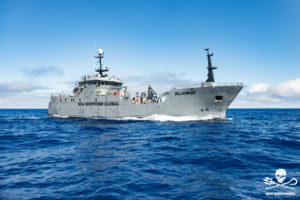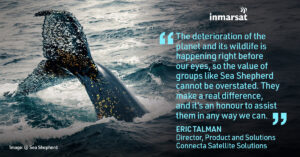Non-profit marine conservation organisation Sea Shepherd Global depends on the reliability, speed, and global coverage of Inmarsat Fleet Xpress to report destructive and illegal fishing practices and ultimately effect positive change.
26 February 2024 – Founded in 1977 as the Earthforce Environmental Society to tackle elephant poaching in Africa, Sea Shepherd moved into marine conservation with the acquisition of its first ship in 1978. Since then, the international non-profit organisation has engaged in a variety of activities focused on protecting ocean wildlife and ending the exploitation and destruction of marine ecosystems.

Crucial to Sea Shepherd’s mission is reliable, high-speed mobile satellite connectivity with global coverage. The organisation is a long-standing partner of Inmarsat Maritime, a Viasat business, with four of its nine current vessels subscribed to Fleet Xpress. This includes Allankay, a 55-metre-long former toothfish longliner deployed to Sea Shepherd’s latest campaign, Operation Antarctica Defence.
An emerging threat to Antarctic wildlife
Thanks in part to Sea Shepherd’s efforts, whales are no longer being hunted in the Southern Ocean. However, they now face a new threat: the overfishing of krill, their primary food source. Through Operation Antarctica Defence, Sea Shepherd is shining a spotlight on the practice of krill fishing, which, while legal, is causing significant damage to Antarctica’s fragile ecosystem.
To highlight this previously unseen issue to an international audience, Allankay travelled to the remote waters of Antarctica, where it documented supertrawlers indiscriminately ploughing through pods of fin whales. With the images sparking global outrage and bringing calls for the krill-fishing industry to be shut down, Sea Shepherd’s ongoing efforts to raise awareness of this harmful practice are having an impact.
Cameras and connectivity
In Operation Antarctica Defence, as in other campaigns, the camera is Sea Shepherd’s weapon. Whether drawing attention to legal yet destructive activities or exposing illegal fishing practices that justify arrests, the ability to “catch vessels in the act” and quickly share photographic evidence is key, said David Wilson, Head of Fleet Communications, Sea Shepherd.
“We require the capabilities to communicate with law enforcement in different jurisdictions and send out media releases as soon as possible to keep the public informed,” he explained. “We also need to track vessels in real time and quickly adopt tactics to catch them in the act – because without showing the world what’s happening or sending evidence to the relevant authorities, we wouldn’t be able to effect positive change.”

With the global coverage of Fleet Xpress, powered by Inmarsat’s Global Xpress Ka-band & ELERA L-band networks, Sea Shepherd maintains mission-critical connectivity even in remote and inhospitable locations like the Southern Ocean. The maritime connectivity service delivers the speed and reliability the organisation requires to report harmful and/or illegal practices from the scene.
Sea Shepherd also uses Fleet Xpress for video conferencing, with Wilson referring to a recent case in which the organisation’s Director of Campaigns, Peter Hammarstedt, virtually attended the World Ocean Summit & Expo 2023 in Lisbon, Portugal, from on board a vessel operating in Antarctica.
A rare privilege
Inmarsat Maritime takes pride in facilitating the decarbonisation initiatives of some of the world’s leading shipping and offshore companies. Yet the rare opportunity to collaborate with non-profit organisations dedicated solely to environmental protection is a particular privilege.
Eric Talman, Director of Product and Solutions at Connecta Satellite Solutions, an Inmarsat Maritime partner, commented: “We serve companies worldwide in all kinds of industries, but nothing is more rewarding – or important – than supporting environmental conservation efforts. The deterioration of the planet and its wildlife is happening right before our eyes, so the value of groups like Sea Shepherd cannot be overstated. They make a real difference, and it’s an honour to assist them in any way we can.”
Christian Cordoba, Account Manager, Inmarsat Maritime, added: “Previously a FleetBroadband user, Sea Shepherd upgraded to Fleet Xpress in 2017. Throughout this collaboration, Inmarsat Maritime has played an integral role in supporting Sea Shepherd’s campaigns, providing mission-critical connectivity in harsh and isolated environments. For me, witnessing first-hand the positive impact of these campaigns has been a true privilege. We are also grateful to Connecta for its support in delivering our solutions to this unique customer.”
Case Study link:
SEA SHEPHERD’S STRATEGIC USE OF CONNECTIVITY IN COMBATING ILLEGAL FISHING
About Viasat
Inmarsat Maritime is now a Viasat business and continues to power the digitalisation of the maritime industry, making operations more efficient and safer than ever before. Viasat is a global communications company that believes everyone and everything in the world can be connected. With offices in 24 countries around the world, our mission shapes how consumers, businesses, governments and militaries around the world communicate and connect. Viasat is developing the ultimate global communications network to power high-quality, reliable, secure, affordable, fast connections to positively impact people’s lives anywhere they are—on the ground, in the air or at sea, while building a sustainable future in space. On May 30, 2023, Viasat completed its acquisition of Inmarsat, combining the teams, technologies and resources of the two companies to create a new global communications partner. Learn more at www.viasat.com, the Viasat News Room or follow us on Facebook, Instagram, LinkedIn, X or YouTube.
Inmarsat Maritime is based in Viasat’s global international business headquarters in London, United Kingdom. For further information about Inmarsat Maritime, follow us on LinkedIn.
